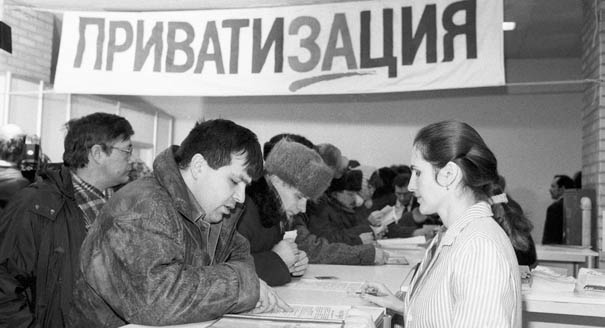The Russian government is launching a new big round of privatizations of state-owned companies, including the Aeroflot airline and two major oil companies, Rosneft and Bashneft.
At first glance, privatization is about property and money. What can be more straightforward than auctioning off state assets to patch up holes in the budget?
But look closer and a different pattern emerges. Privatization in Russia is an intensely political matter, which is all about rewarding loyalty and setting new rules of political behavior.
In post-socialist Russia, something more subtle than legislation or the amounts of cash on offer always determines the what, why, and who of a privatization sale. Even an investor as seasoned as George Soros learned this lesson the hard way when he fell for the sale of the Svyazinvest telecommunications company in 1997 but had to cut his multimillion-dollar losses in the deal seven years later.
Another case in point is the recent saga over the attempted sell-off of the Vologda Dairy Factory, a medium-sized business that many Russians felt a strong emotional attachment to. When it was put up for sale last year, thousands of people signed a petition to President Putin, asking him to save this “unique factory” and “the standard-bearer of the dairy industry,” which produced the well-known Vologda brand of butter.
Parliamentarian Maria Kozhevnikova sounded the alarm about the fate of the factory, claiming that unknown foreigners were threatening to take over the factory and launch “production of MARGARINE (capitals in the original), a product prohibited in most European countries and the United States.” Apparently, the prospect of Russian children being exposed to the threat of margarine was enough for Deputy Prime Minister Arkady Dvorkovich to kill off the privatization deal and forgo the anticipated proceeds of around 1 billion rubles.
Russians still recall the twelve notorious “loans-for-shares” auctions of the mid-1990s, during Boris Yeltsin’s presidency, in which major state assets were sold off for a return of less than 900 million dollars to the Russian state coffers. The architect of those sales—and founding father of privatization in Russia—Anatoly Chubais, justified them at the time by saying that had it not been for those deals with the Yeltsin-era oligarchs of the day, “the Communists would have won the elections in 1996.”
Russia’s last major privatization project was launched in 2012 but then quietly wound up, suggesting there was a lack of interest in it right at the top. But even though less than half of the goal of 450 billion rubles (then about $15 billion dollars) was raised, the sale still set a Russian record. According to Accounts Chamber reports, the state fell 80 percent short of its privatization program targets from 2010 to 2014 and received less than 5 percent of its target amount in 2015.
The latest pressure to privatize certainly does not come from foreign investors, who are currently not the most welcome guests in Russia. So is it then just about cash?
The 2016 budget certainly lacks the healthy glow it had a few years ago. The government is cutting costs and can see rock bottom quite close. The market environment has seriously deteriorated since the takeover of Crimea, and it is much harder now to sell state property at a time when oil prices keep hitting new record lows. The Western sanctions regime also curtails financial flows into the country, which reduces the value of all Russian assets.
And yet, as we have already established, it’s not really about money. Even though the current projected privatization revenues are 27 times higher than the initial forecasts made in the budget legislation, the anticipated sum of 893 billion rubles still only slightly exceeds 1 percent of this year’s GDP. If history is any guide, only 20 percent of privatization targets will be met and that will bring the proceeds to a total of just 0.2 percent of the GDP level of the loans-for-share years of the 1990s.
Which is to say, massive-scale privatization clearly isn’t going to save the budget. No one in the government believes that privatization will improve economic efficiency either. Despite the government’s periodic homilies on the importance of private property, all of its actual policies in recent years speak to the contrary.
The truth is that, just as in Yeltsin’s “time of troubles” in 1995, privatization is again a way for Russia’s elite to sign another Magna Carta that regulates the working of the state. A deceptively simple cash-for-property exchange is hiding a complex system of moral agreements that establish the primacy of loyalty and the borders of permissible behavior.
Unlike its 800-year-old English predecessor, our modern Russian version of the Magna Carta has no publically accessible original or copies. We can’t even rely on word-of-mouth versions, since they change all the time.
Most members of the business elite are currently on their best behavior and bending over backwards to follow the accepted rules of the game. Yet those at the very top of the pyramid have evidently decided that, as Russia faces new economic turbulence, they should remind everyone at all levels of society how they should behave.
Nowadays, everyone understands what is involved in a Russian privatization. It means making a symbolic (ridiculously low) payment for a no-less-symbolic asset. Specific individuals get to manage the assets allocated to them as long as they stick to the rules. Those who are unwilling to immediately part with assets bestowed on them in favor of more worthy successors break the rules and can easily find themselves deprived not just of their new possessions, but of their freedoms as well. Those who are especially stubborn can end up very far from home for a long stretch of time.
Do the prospective buyers of the Bashneft oil company, which is up for sale again, know this? Do the current beneficiaries of the assets of the Yukos oil company remember it? Is this understood by the current owners of Domodedovo Airport? Of course, everybody knows. But another reminder won’t hurt.



